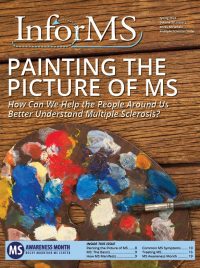
Aisha is 29 and was diagnosed with MS five years ago.
What were some of the early symptoms you experienced?
I started to get numbness and a tingling sensation in my right foot. As weeks progressed, the numbness and tingling went all the way up into my leg. Then my right arm started to feel numb. I was doing yoga regularly and I started to have balance issues, tumbling over all the time, doing moves that I’d done fine a couple of weeks prior. I remember being in the shower and I was bending over washing my hair and I completely fell because I lost all coordination and balance.
Then it started to get worse, to where I would lose complete function of my right leg. I would have to sit down and wait for my leg to start working again. Then I started to have Lhermitte’s sign which feels like an electric shock sensation going down your spine which would happen when I bent my neck forward. The urgent care doctor advised me to see a neurologist. First, I scheduled an appointment with my primary care provider and then I got an MRI. My doctor suspected it might be MS and sent me to an MS specialist at UC Health. I was diagnosed with MS six months after the onset of those first symptoms.
How has MS impacted your life?
I’ve been doing well since those early symptoms and I started a good medication right away. I do have lingering symptoms. Especially if I overheat, my right arm and right leg go numb for a little bit. But as soon as I go back to regular body temperature, it goes away.
What does your support system look like?
I have an amazing support system. I moved to Colorado for graduate school, so my entire family still lives in Florida. Luckily, I made great friends who were there for me during the process of getting diagnosed. They came to my MRIs and my doctor appointments which was amazing. I was 24 when all this was happening, so my parents encouraged me to move back to be closer to them. But I decided to stay; they traveled to be with me, and I was so grateful.
Being a therapist, I know how important social support is and it was helpful for me to connect with people with similar experiences. Within the first couple of months of getting diagnosed, I reached out and got involved in the MS Center’s Young Professionals Network (MSYPN). And I was part of a group that would meet up socially like once a month and hanging out with people who understand and who get it at a different level is very important for not feeling so isolated and alone.
What is your favorite coping mechanism?
My dog is the best coping mechanism for me. When we go for walks, he’ll go off my pace and match my energy. If I am having lower energy that day, we’ll go on a slower walk. When I was having symptoms, if I needed a break for my leg to start working again, we would sit down together. Walking with him got me out of the house and outside which I love to do. That’s an overall mood booster for me, to be outside in the beautiful Colorado weather. My sweet dog helped me through a really difficult time.
Are there ways that your perspective on MS has shifted over time?
I think my perspective has shifted a great deal. During the first couple of years, I felt like my life was going to be over. I was very angry, too. I kept thinking “Why me?” Now, I’m doing well and seeing so many other people doing well, too. I can still do a lot of the things I want to do. I am still super active – I love going hiking, and I snowboard during the winter. Three years ago, I didn’t think I was ever going to be able to hike or snowboard again. I think about MS almost as a silver lining in my life, because when something like that happens, you realize what’s important in life. It’s really helped me put into perspective what’s truly important and what I want to focus on.
Was there anything you weren’t expecting or that surprised you?
When I was going through the diagnosis process, I was surprised that my doctors didn’t talk about the emotional side of being diagnosed with and living with MS. There was a lot of focus on the physical side of things, but not much focus on the anger, sadness and grief. There are a lot of emotions that come with being diagnosed with MS, being diagnosed with a chronic illness. I think that can be overwhelming. I am lucky enough that I have a support system but not everybody is as lucky. When I’m talking with others who have been diagnosed, I always encourage them to pay attention to the emotional part of MS. Give yourself space to feel some of those emotions and go through a grieving process if you need to. Really spend some time making sure that you are okay emotionally.
What gives you hope?
There is so much research going into MS research to find causes and cures. I feel like every year I am seeing different articles about new medications coming out and new research coming out about the origins of MS. The medications that are available now are leaps and bounds more effective than what was out there 20 years ago. Seeing how effective the medication has been for me gives me a lot of hope too. It might not be in my lifetime, but I am hopeful that in the future, there will be a cure or something that will entirely stop the progression of MS.



